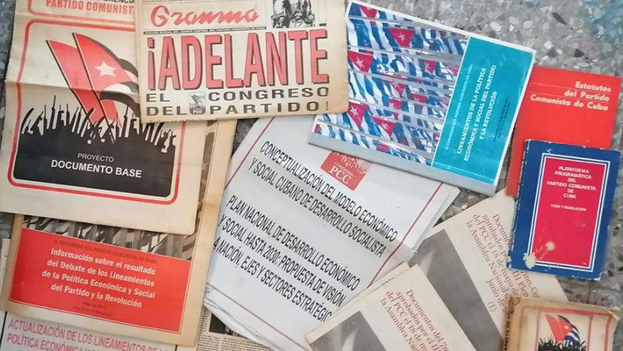
![]() 14ymedio, Reinaldo Escobar, Havana, 17 March 2021 –With one month remaining until the Eighth Congress of the Communist Party of Cuba (PCC), it has been reported that in the process of updating the 274 Guidelines approved in the Seventh Congress, only 17 will remain, 165 will be modified, 92 will be eliminated and 18 will be added, so that the new document will only have 200 guidelines.
14ymedio, Reinaldo Escobar, Havana, 17 March 2021 –With one month remaining until the Eighth Congress of the Communist Party of Cuba (PCC), it has been reported that in the process of updating the 274 Guidelines approved in the Seventh Congress, only 17 will remain, 165 will be modified, 92 will be eliminated and 18 will be added, so that the new document will only have 200 guidelines.
A suggestion is being made to modify 80 paragraphs of the 342 being proposed regarding the document of the Conceptualization of the Economic Model.
It should be assumed that this last writing has a hierarchical level higher than the guidelines, therefore, any variance in the wording of a given topic, however slight, will need to be read with great care.
In the five years that have elapsed since the previous great partisan edict, neither the issue of the practical application of the Guidelines (liniments in popular slang) nor the theoretical formulation of the conceptualization have constituted material for debate in the official or in the independent press, and even less so on the street. “Who cares?” Thalía would have asked in the popular theme song.
I would like to point out the evolution that this issue has had since April 2011, when in the Sixth Congress of the PCC approved that “in non-state matters of management, the concentration of property in legal or natural persons will not be allowed”
At the risk of appearing too optimistic, I would like to point out how the issue of property concentration will remain both in the new guidelines and in the rewriting of the Conceptualization of the model.
Since it is a core issue, I would like to point out the evolution that this issue has had since April 2011, when in the Sixth Congress of the PCC approved that “in non-state matters of management, the concentration of property in legal or natural persons will not be allowed”
It turns out that after five years, on 18 May 2017, to be more precise, the Third Plenary of the Central Committee of the PCC agreed to raise the issue to the next congress in this way: “In non-state management issues, the concentration of property or material and financial wealth in non-state natural or legal persons will not be allowed. Continue updating regulations to prevent them from contradicting the principles of our socialism”.
Perhaps the most significant thing is that “material and financial wealth” was added and that the prohibition was based on “the principles of our socialism”.
When presenting the Conceptualization approved as a proposal at that same meeting of the PCC, the wording of the problem required two paragraphs:
“The appropriation by the holders of non-state forms of ownership and management of part of the surplus of the results of the work of contracted people takes place in a social context in which socialist relations of production prevail, as opposed to social systems based on the exploitation of the work of others”.
“Consequently, the concentration of property and material and financial wealth in non-state natural or legal persons is the object of regulation, so as not to allow it to run counter to the principles of our socialism.”
Here, “what was prohibited” (not allowed) became “subject to regulation”.
It is noticeable that in the highest instance where these details are discussed there are two positions: one, that of prohibiting the concentration of property, and the other, that of only regulating it
However, in April 2016, at the conclusion of the Seventh Congress, the paragraph in the Guidelines was approved in this way: “In non-state forms of management, the concentration of property and wealth in legal or natural persons will not be allowed, but will be regulated”.
And in the Conceptualization approved by that same congress: “The concentration of property and wealth in non-state natural or legal persons is not allowed in accordance with the legislation, in a manner consistent with the principles of our socialism”.
In this back and forth it is noticeable that in the highest instance where these details are discussed there are two positions: one, that of prohibiting the concentration of property, and the other, that of only regulating it and at the same time including in what is prohibited or regulated “material and financial wealth”.
The question of whether the existence of small and medium-sized enterprises (SMEs) will be approved in the next congress depends entirely on how this point is written, both in the Conceptualization and in the Guidelines.
The formal approval of SMEs is a point of no return in the often slowed down economic reforms suggested by specialists and demanded by entrepreneurs. Small and medium-sized companies that have a wholesale market and the right to export and import; entities with legal personality backed by laws that protect the freedom to produce goods or provide services, to set prices and hire workforce without being subject to taxes that suck dry their profits.
We’ll need to see if it will follow the line that there can be nothing “that runs counter to the principles of our socialism”.
Translated by Norma Whiting
____________
COLLABORATE WITH OUR WORK: The 14ymedio team is committed to practicing serious journalism that reflects Cuba’s reality in all its depth. Thank you for joining us on this long journey. We invite you to continue supporting us by becoming a member of 14ymedio now. Together we can continue transforming journalism in Cuba.
